Related Research Articles

Buffalo Springfield was a rock band formed in Los Angeles by Canadian musicians Neil Young, Bruce Palmer and Dewey Martin and American musicians Stephen Stills and Richie Furay. The group, widely known for the song "For What It's Worth", released three albums and several singles from 1966 to 1968. Their music combined elements of folk music and country music with British Invasion and psychedelic rock influences. Like contemporary band the Byrds, they were key to the early development of folk rock. The band took their name from a steamroller parked outside their house.

Stephen Arthur Stills is an American musician, singer, and songwriter best known for his work with Buffalo Springfield, Crosby, Stills & Nash, and Manassas. As both a solo act and member of three successful bands, Stills has combined record sales of over 35 million albums. He was ranked number 28 in Rolling Stone's 2003 list of "The 100 Greatest Guitarists of All Time" and number 47 in the 2011 list. Stills became the first person to be inducted twice on the same night into the Rock and Roll Hall of Fame. According to Neil Young, "Stephen is a genius".
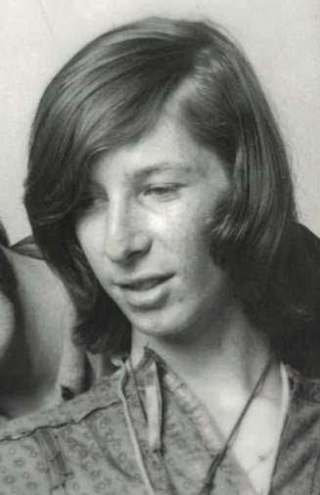
Bruce Palmer was a Canadian musician best known as the bassist in the folk rock band Buffalo Springfield, who were inducted into the Rock and Roll Hall of Fame in 1997.
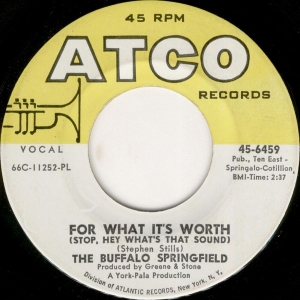
"For What It's Worth " is a song written by Stephen Stills. Performed by Buffalo Springfield, it was recorded on December 5, 1966, released as a single on Atco Records in December 1966 and peaked at No. 7 on the Billboard Hot 100 chart in the spring of 1967.
The Vejtables were an American rock band from Millbrae, California, United States. They recorded for the Autumn label and found limited success with such songs as "I Still Love You" and a cover version of Tom Paxton's "The Last Thing on My Mind".

"Hello, I Love You" is a song recorded by American rock band the Doors for their 1968 album Waiting for the Sun. Elektra Records released it as a single that same year, which topped the charts in the U.S. and Canada. Although the Doors are credited as the songwriters, songs by other artists have been identified as likely sources.
"Paper Sun" is a song by British rock band Traffic, and was released as their debut single in May 1967. It was a number 5 hit in the United Kingdom, number 4 in Canada.
The Cryan' Shames are an American garage rock band from Hinsdale, Illinois. Originally known as The Travelers, the band was formed by Tom Doody ("Toad"), Gerry Stone ("Stonehenge"), Dave Purple ("Grape") of The Prowlers, Denny Conroy from Possum River, and Jim Fairs from The Roosters, Jim Pilster, and Bill Hughes. The band's most successful song was their cover of The Searchers' "Sugar and Spice".

"Who Do You Love?" is a song written by American rock and roll pioneer Bo Diddley. Recorded in 1956, it is one of his most popular and enduring works. The song represents one of Bo Diddley's strongest lyrical efforts and uses a combination of hoodoo-type imagery and boasting. It is an upbeat rocker, but the original did not use the signature Bo Diddley beat rhythm.
"Everybody Needs Somebody to Love" is a song written by Bert Berns, Solomon Burke, and Jerry Wexler, and originally recorded by Burke under the production of Berns at Atlantic Records in 1964. Burke's version charted in 1964, but missed the US top 40, peaking at number 58.

Psychedelic Lollipop is the debut album by the American rock band the Blues Magoos, and is one of the first records to have the word “psychedelic” on the sleeve. Their single “(We Ain't Got) Nothin' Yet” was their most successful effort, rising into the Top 10 on many national charts. Guitarist Emil “Peppy” Thielhelm was 16 years old at the time of the single’s release. The band recorded five more albums with various lineups, none reaching the success of Psychedelic Lollipop.

"Dream Police" is a song written by Rick Nielsen and originally released in 1979 by the American rock band Cheap Trick. It is the first track on the group's album of the same name. The single peaked at #26 on the Billboard Hot 100. Nielsen has stated that the song "is an attempt to take a heavy thought - a quick bit of REM snatched right before waking up - and put into a pop format." He also stated that "the song was about Big Brother watching you."
We the People was an American garage rock band from Orlando, Florida, that was formed in late 1965 and professionally active between 1966 and 1970. Although none of their singles charted nationally in the U.S., a number of them did reach the Top 10 of the local Orlando charts. The band are perhaps best remembered for their song "Mirror of Your Mind", which reached the Top 10 in a number of regional singles charts across the U.S. during 1966. The song has subsequently been included on several compilation albums over the years.

"Bluebird" is a song recorded by the American rock group Buffalo Springfield. It was written and produced by Stephen Stills, with co-production by Ahmet Ertegun. In June 1967, Atco Records released it as a single to follow-up their hit "For What It's Worth" (1966).

The Mojo Men was an American rock band based in San Francisco. Formed in 1965, the group underwent several name and personnel changes until their 1969 breakup. Their highest-charting Billboard Hot 100 single was a cover of Buffalo Springfield's "Sit Down, I Think I Love You", which peaked at number 36 in 1967.
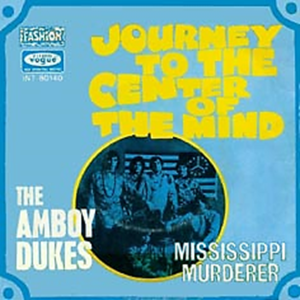
"Journey to the Center of the Mind" is a song released by the Amboy Dukes in June 1968. It reached No.16 on the Billboard charts in 1968 and No.19 in Canada.
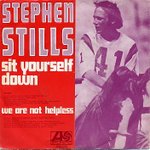
"Sit Yourself Down" is a song written by Stephen Stills that was released on his 1970 solo debut album Stephen Stills. It was also released as the second single from the album, following the Top 20 hit "Love the One You're With." and reached the Top 40, peaking at #37.
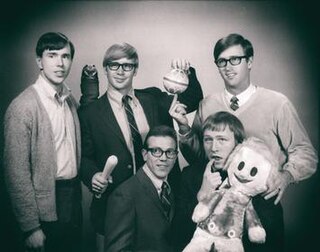
The Kitchen Cinq were an American garage rock band from Amarillo, Texas active in the 1960s, whose lineup included guitarist and songwriter Jim Parker. They evolved out of the Illusions and eventually changed their name to the Y'alls, releasing records under both names, and enjoyed regional success before moving to Los Angeles, where they signed with Lee Hazlewood's LHI label and became the Kitchen Cinq. As the Kitchen Cinq they recorded five singles between 1966 and 1968, as well as the album Everything but the Kitchen Cinq, released in 1967. In December 1967, they released a single under the alias a Handful, but returned to their better-known moniker for their final release in 1968.
Jan Errico is a drummer and singer who was a member of two San Francisco rock groups in the 1960s, The Vejtables and The Mojo Men.

"Nowadays Clancy Can't Even Sing" is a song by the Canadian-American folk rock band Buffalo Springfield, released as the group's debut single in 1966. Neil Young wrote the song in Yorkville in 1965 shortly after returning from a series of performances in Toronto, during a period when his bid at a solo career had been met with little positive response. The lyrics reflect metaphorically on Young's frustration toward his stalled career in music, and was inspired by Ross "Clancy" Smith, an aberrant classmate who incited awe in his school. Commentators recognize "Nowadays Clancy Can't Even Sing" as one of Buffalo Springfield's signature songs, as well as a milestone in Young's progression as a songwriter.
References
- ↑ Moon, Tom (August 28, 2008). "Buffalo Springfield - Retrospective". 1,000 Recordings To Hear Before You Die. Workman Publishing Company. pp. 129–130. ISBN 9-780761-139638.
- ↑ Zimmer, Dave (2000). Crosby, Stills & Nash: The Authorized Biography (The Definitive Inside Story of the Supergroup) . New York: Da Capo Press. p. 30. ISBN 978-0306809743.
- 1 2 Greenwald, Matthew. "'Sit Down, I Think I Love You' Song Review". Allmusic . Retrieved December 14, 2013.
- ↑ Swanson, Dave (February 26, 2013). "Top 10 Buffalo Springfield Songs". Ultimate Classic Rock (Townsquare Media). Retrieved December 14, 2013.
- 1 2 "The Mojo Men – 'Billboard' Singles". Allmusic . Retrieved December 14, 2013.
- 1 2 "RPM 100 – Top Singles". RPM . 7 (6). RPM Music Publications Ltd. April 8, 1967. ISSN 0315-5994 . Retrieved July 15, 2017.
- ↑ O'Connor, Rob (July 9, 2009). "25 Garage Rock Heroes". Yahoo! Music . Retrieved December 14, 2013.
- ↑ "Cash Box Top 100 04/08/67". Cashbox Magazine, Inc. Retrieved December 14, 2013.
- ↑ "Artists – The Executives". MilesAgo. Retrieved December 14, 2013.
- ↑ McIntyre, Iain (2006). Tomorrow Is Today: Australia in the Psychedelic Era, 1966–1970. Kent Town: Wakefield Press. p. 52. ISBN 978-1862546974.